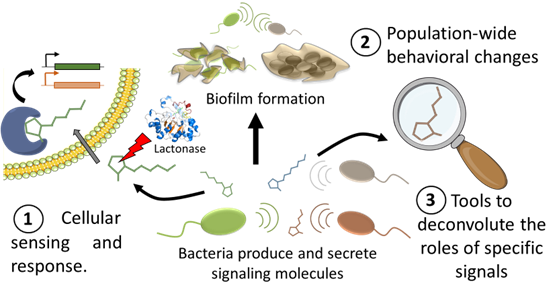Bacteria communication, also known as quorum sensing (QS), relies on chemical signaling molecules called autoinducers (AIs), to regulate bacterial gene expression. N-acyl homoserine lactone (AHL), a major class of AIs, varies in chemical structures, particularly with different acyl chain lengths. These signals, like human languages, differ between bacterial species. Several bacterial behaviors are controlled by QS, including biofilm formation and virulence production. Biofilm exists in various infections, including numerous livestock and plant pathogens that are threatening food security and reducing productivity. Current biofilm control strategies are efficient to some extent, but they are still far from the desired effect and control. AHL lactonases, which degrade AHL by hydrolyzing the lactone ring of AHL, have been shown to effectively inhibit biofilm development.
It has recently been discovered that interference in QS also leads to alteration in the microbial community. However, these community changes are still poorly characterized. Additionally, the potential changes induced by different enzymes on communities have not been investigated. PhD student Mai Beauclaire (Biochemistry, Molecular Biology, and Biophysics), in a project called “The Importance of Microbial Signaling for Communities and Other Microorganisms,” is working to determine the changes induced by different enzymes in communities, including livestock gut microbiomes. Using different enzymes, Beauclaire and colleagues will test the hypothesis that different enzymes can lead to different alterations of microbial communities. The results will provide critical evidence for the potential of these enzymes in editing microbiomes that may promote health and growth benefits to livestock and sustainability in animal agriculture.
Some funding for this project was provided by a 2023 RC-MnDRIVE PhD Graduate Assistantship. The RC-MnDRIVE PhD Graduate Assistantship Program supports U of M PhD candidates pursuing research at the intersection of informatics and any of the five MnDRIVE areas:
- Robotics
- Global Food
- Environment
- Conditions
- Cancer Clinical Trials
This project is part of the Global Food and Environment MnDRIVE areas. See the complete list of the RC PhD Graduate Assistantships for 2023.
